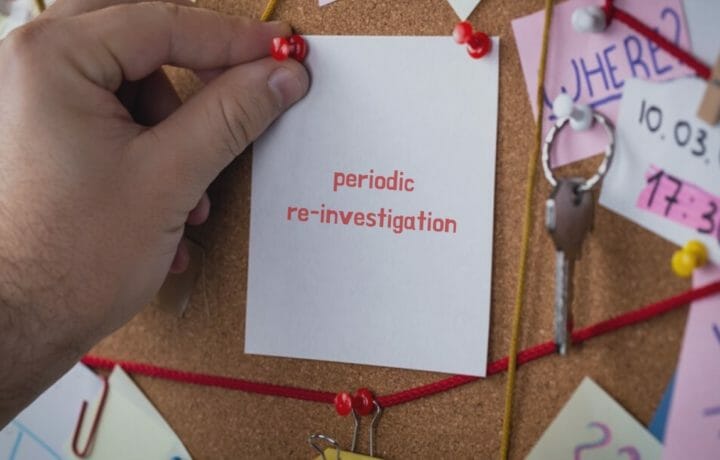Continuous evaluation is being rolled out to a growing segment of the cleared population, but that doesn’t mean periodic reinvestigations have gone away (yet). If you hold a Top Secret government clearance, there is a good chance you still have to submit a new security clearance application as a part of an every-six-years periodic review. In most cases, six years is a decent amount of time to prepare for your periodic reinvestigation. In fact, it is easy to lose track of time by putting off thinking about it for 6 years. Then one day, your security officer notifies you that it is time for your periodic reinvestigation (PR). As is the case with most clients, they will allow you to continue working in your current role until your PR is done and your clearance has been adjudicated. For others, this is a doomsday scenario.
Depending on your level of clearance and access, your client may revoke your access to the data you need to do your job, and may even revoke your access to the site altogether. When this happens, you could be looking at a year or more of being out of work, or ‘on the bench’ as they say. To think it will just take a couple of weeks for them to complete your PR and then you can go back to work is a pipe dream. For some, it may only take a month or two, but for others, it could take up to a year or more.
Can it really take over a year to get the PR and clearance adjudicated? The answer is a resounding yes, and shockingly for some it could take even longer, depending on what you have been up to for the past five or six years. Did you get married and/or divorced? Have any kids (naturally or adopted)? Move several times? Get into financial trouble (bankruptcy/foreclosure)? Start a close and continuing relationship with a foreign national? Travel outside of the country? If any of those situations have happened to you in the past six years, you can bet on your PR taking longer than usual, not taking into account any agency delays.
If you fall into the category of your PR holding your work life hostage, have faith. There are a few ways you can speed things up. In actuality, you can’t force the hand of an investigator, or force them to skip things they need to do in regards to your file. But you can do a few things to help things move along at a pace more suited to your situation.
engage Your Facility Security Officer
Every company that does work with the government and positions that require clearances is required to have a facility security officer (FSO). If you don’t know who your FSO is, get with your supervisor or project manager and find out – they are required to know who it is. The FSO has access to JPAS and Scattered Castles, and can obtain information on state of your PR. Now, that doesn’t mean they can see a progress bar or a percentage complete (maybe someday!), but they will get an idea of what is currently being done can call OPM to request a more detailed update. This is the first step to take when trying to speed along your PR.
Write a Letter to Your Congressional Representative
Yes, you can write a letter to the office of your congressman/woman and they are surprisingly responsive. You can go online and find your congressional representative’s contact information. They have offices locally, and one in Washington, D.C. The best thing to do is to send a letter to both locations. Each state has multiple congressional members, two senators and your congressional district representative. Send a letter to them all! Alternatively, you can also call their office and request a congressional inquiry be submitted on the status of your PR. When writing your letter to congress, the most important thing to include is your contact information, to include your email address, phone number and physical address. In keeping up with the times, you can now submit your request for a congressional inquiry via a web form, however a handwritten or typed letter may hold more weight.
Be Patient, not Complacent
There is an aspect of patience involved in the PR process; you have to exercise an extreme level of patience. However, patience does not equal complacence. Don’t become complacent, stay in control of your PR process as much as you can by holding your FSO and congressional representatives responsible for tracking down the individuals working your PR. Be patience, cross your fingers and hope for the best.




